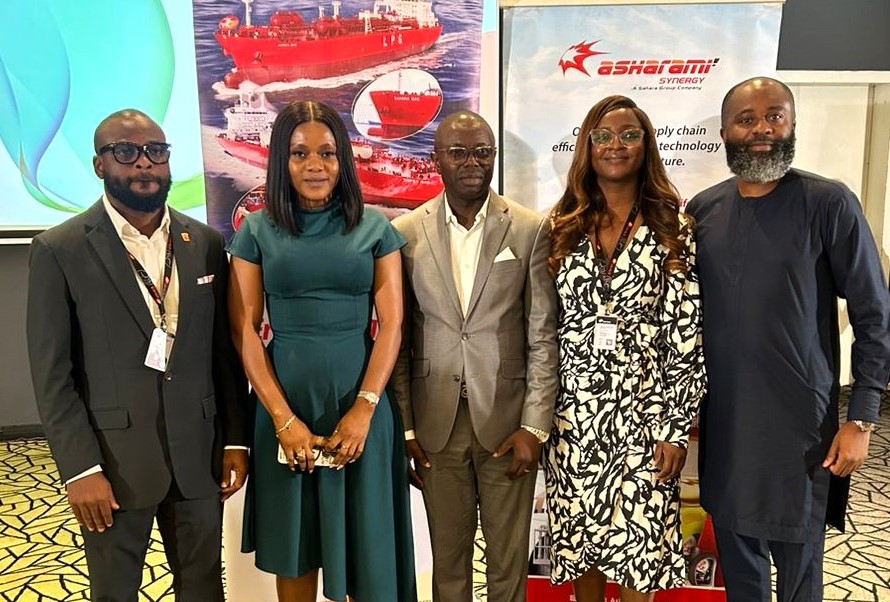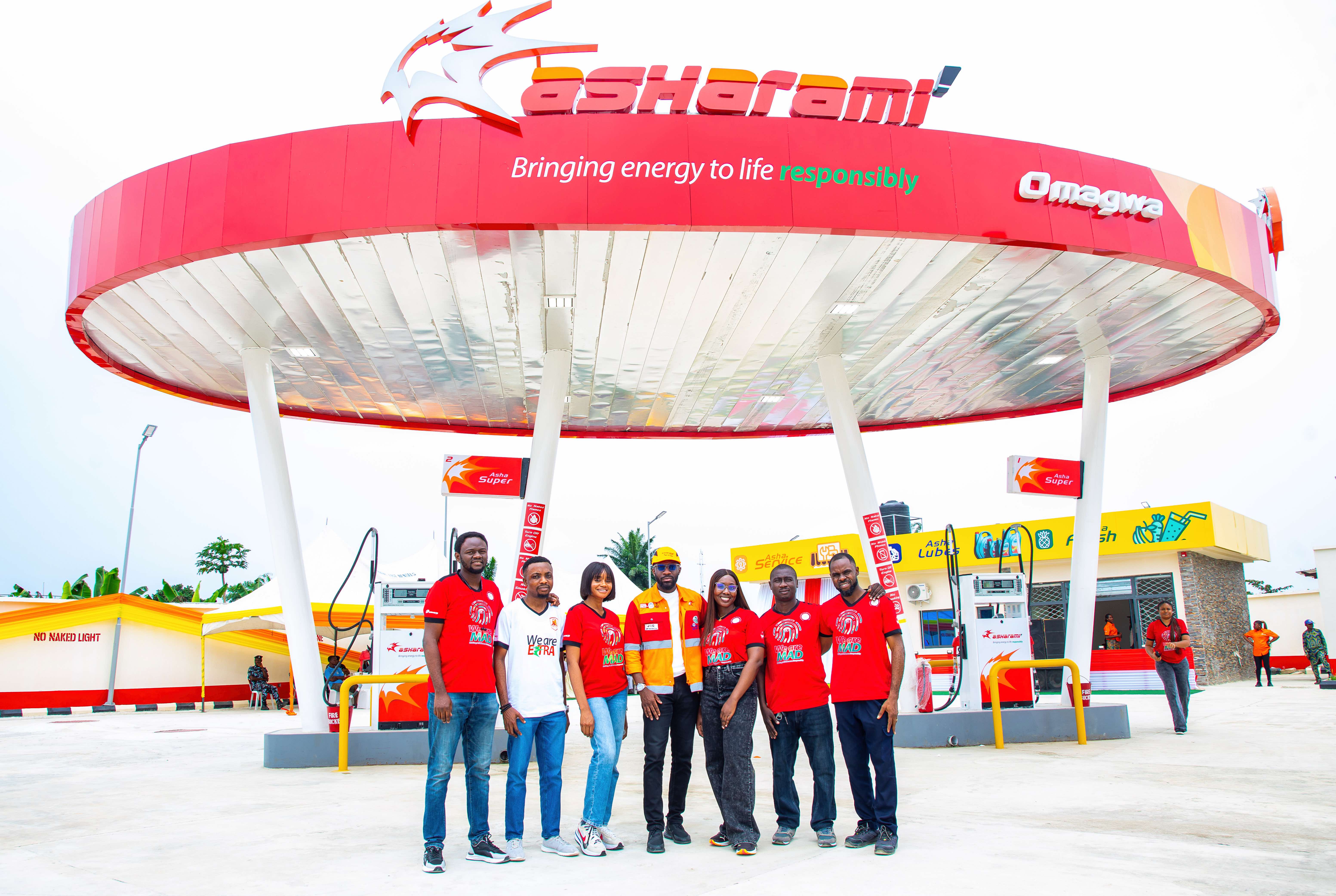Energy
Clean Energy: Asharami Synergy, NMDPRA, Customers Partner

Asharami Synergy, a leading Sahara Group Downstream Company has reiterated its commitment to promoting the adoption of cleaner fuels in the sector, working in collaboration with regulatory authorities and delivering exceptional fuel solutions responsibly.
At Asharami Synergy 2024 Customer Forum, Managing Director, Foluso Sobanjo pointed out that the company remained dedicated to spearheading the quest for environmental sustainability in Nigeria’s downstream operations across the sector’s value chain.
Sobanjo told the company’s customers that Asharami was delighted to serve as their preferred energy solutions provider, adding that Asharami had since commenced the supply of low sulphur fuels in line with the Afri-5 specifications prescribed by African Refiners and Distributors Association (ARDA) and in compliance with the provision of the Petroleum Industry Act (PIA) 2021 which limits the sulphur content in Gasoil/Diesel to 50ppm (parts per million).
He said, “Given our track record of transparency, integrity, and service excellence in the sector, we are using this forum to keep our esteemed customers abreast of new developments in the sector, especially the switch to the AFRI-5 low-sulphur specification which makes diesel appear lighter.
“This does not reduce the quality or performance of the product as all parameters remain the same as specified by the Standards Organization of Nigeria (SON).”
In the same vein, Head, Distribution System Storage Infrastructure, Lagos SW, Nigeria Midstream and Downstream Petroleum Regulatory Authority (NMDPRA), Engr. Oluwakayode Oyegoke, reassured the public that the new directive would help reduce pollution and promote the well-being of Nigerians.
“The NMDPRA would like to commend Asharami Synergy for providing this platform to help create more awareness and educate the buying public about the new fuel specifications. The Authority would also like to assure all stakeholders that the products in circulation meet all requirements for safety, quality, and environmental sustainability. The industry is evolving, and we have to move with the world towards cleaner energy. Economically, the transition to low-Sulphur fuels can attract investment, create jobs, and reduce the country’s carbon footprint,” he said.
On his part, Chief Marketing Officer, Asharami Synergy, Adeoti Onabolu commended the company’s customers for their patronage, stating, “serving you is a privilege we hold dear, and your satisfaction is the ultimate success factor and motivation for us to diligently and unceasingly work towards bringing energy to your lives and businesses responsibly.”
Onabolu said Asharami leverages Sahara Group’s global footprint and strategic investments to deliver exceptional fuel solutions and expand its operations across sub-Saharan Africa.
She said Asharami Synergy’s vertically integrated downstream business encompasses the entire value chain from top quality product sourcing to the final sales to the end consumers.
“We build, own, operate, maintain, and manage multiple storage facilities across several locations to the best international standards and manage an efficient, safe, and technology-driven logistics and supply operation via vessels, trucks, pipeline and rail to ensure product integrity and safety. Our International Standards Organisation (ISO) certifications reinforce Asharami’s distinctive mark of service excellence, quality, safety, innovation, and environmental sustainability,” she said.
The company’s Chief Operating Officer, Adekanmi Adesola said Asharami was commited to driving product quality and availability, competitive pricing, and service excellence as it continues to work with customers to co-create value responsibly.
Energy
Asharami Synergy Unveils Fuelling Solutions In Omagwa

In line with its commitment to driving access to quality petroleum products, Asharami Synergy Limited, a leading Sahara Group downstream company, has said the public can now access exceptional fuelling solutions at its newly commissioned retail station in Omagwa, Rivers State.
Situated strategically along the Airport Road in Omagwa, the station, which features a storage capacity of 45,000 litres each for Automotive Gas Oil (AGO, also known as diesel) and Premium Motor Spirit (PMS, also known as petrol) is equipped with two pumps and four discharge nozzles for PMS and AGO.
The facility also has ample space for sundry services in a bid to ensure consumers get more “miles and smiles” as well as the energy to “go further” with Asharami’s world-class products.
“The Asharami Omagwa Retail Station is fully operational, offering a range of premium products and services. It’s a one-stop shop that also gives our esteemed customers eat-in and take-out restaurant services, shopping, as well as the Asha lubricants and Asha Service experience which will ensure premium care for all classes of automobiles and engines,” said Oladimeji Williams, Head, Government Relations and Business Development at Asharami Synergy.
ALSO READ: NNPCL Launches Utapate Crude Oil Blend, Eyes Production Expansion In 2025
At the Commissioning, Willaims said the new station represents an important step in Asharami Synergy’s expansion plan aimed at reaching and serving more communities responsibly. “This station is strategically positioned close to the airport, serving as the gateway for powering socio-economic development in the community and those close to it, while enabling Asharami Synergy integrate all aspects of its downstream business towards ensuring efficiency and value for our customers,” he stated.
Williams commended the Federal Airport Authority of Nigeria (FAAN) and the Omagwa community leaders for their support and collaboration throughout the project’s duration, describing it as a “seamless and productive process that highlights Asharami’s corporate stewardship and social impact” in the community.
Similarly, Ifesinachi Ezike, Regional General Manager (South South), FAAN, emphasized the broader significance of the new station, stating, “This occasion marks a significant milestone not just for Asharami Synergy but for the airport and the entire community. It marks not just an opening of a new facility but the beginning of a renewed commitment to enhancing the travel experience of all our passengers and stakeholders”.
In a move that underscores its commitment to sustainability and community development, Asharami Synergy also commissioned a solar-powered borehole during the launch. The borehole is set to improve access to clean and reliable water for residents, marking a tangible contribution to the local community.
“At Sahara, we are always making a difference—not just through our business operations; we are unwavering in our commitment to driving sustainable development and building partnerships that enhance the well-being of our host communities,” Williams added.
Energy
Awards Galore For Shell, Staff At NAPE 2024 Conference

The Shell companies in Nigeria and staff won awards in recognition of their robust participation at the 42nd Annual International Conference and Exhibition of the National Association of Petroleum Explorationists (NAPE), held in Lagos.
At the closing dinner of the event, the Managing Director of Shell Nigeria Exploration and Production Company (SNEPCo), Ronald Adams pledged sustained efforts by the company to address “the Nigerian energy trilemma by powering progress towards energy security in a sustainable manner”.
On the awards, the Shell was declared Best Overall Exhibitor and Best Exhibiting Energy company (International) just as Geophysicist Somime Oguntola took home the Award of Excellence for Oral Paper (second place).
The icing on the cake was a Shell staff, Johnbosco Uche, being installed as the new President of the NAPE.
It was gathered that the Shell companies in Nigeria have supported NAPE since its founding in 1975, using the skills and expertise of the large pool of energy professionals in its employment to improve its activities especially educational and mentoring programmes.
In addition to being a major sponsor of the 2024 conference, Shell mounted a high-profile exhibition, featuring among other things, career counselling, engagements on Nigerian Content and Contractor development and panel sessions on Women in Industry and Sustainability Energy Challenge.
A highlight was the Shell medical stand which attended to more than more than 500 conference participants and members of the public over the four days of the annual event. The doctors and nurses offered a wide range of services including laboratory tests, deworming, medical consultation as well as ophthalmology checks and distribution of nearly 300 eyeglasses.
Adams referred to the operations of SNEPCo as an example of Shell’s contribution to energy security in Nigeria. “As a result of sustained production from Bonga, we have provided funds to finance development, created a new generation of Nigerian Deepwater professionals, empowered indigenous contractors and service providers, and implemented social investments that have touched lives in the six geo-political zones of the country,” he said.
Adams added, “SNEPCo and indeed Shell are in Nigeria for the long haul. Our commitment is reflected in both our current and growth plans, all of which are grounded in principles of safety, affordability, and competitive performance.”
Energy
Accugas Denies Culpability In Akwa Ibom’s Power Outage

Owing to the persistent power outage, which has crippled economic and social life in most parts of Akwa Ibom State and environs, Accugas Limited has washed its hands off the ugly situation.
This was contained in a statement under the signature of its Communications Manager, Okwudili Onyia, in which the company traced the anomaly to a “fault in the 132-KV Aba-Itu transmission line”.
To ameliorate the situation, the company maintained that “It is imperative that the restoration of the Aba-Itu line is completed as soon as possible.”
In addition, the company pledged thus, “Accugas will continue to partner with, and support, the government of Akwa Ibom State towards achieving the government’s agenda for economic development and prosperity of the state.”
ALSO READ: NNPC Ltd To Supply 100mmscf/d Gas To Dangote Refinery
The statement reads, “Accugas Limited, a subsidiary of Savannah Energy, wishes to strongly deny the misinformation concerning its alleged involvement in the current power outage in Akwa Ibom State.
“The power cut in Akwa Ibom State is entirely due to the reported fault in the 132-KV Aba-Itu transmission line, which, unfortunately, is preventing power being transmitted from the National Grid into the State. It is imperative that the restoration of the Aba-Itu line is completed as soon as possible.
“Ibom Power Company (“IPC”) is one of 23 thermal power generation companies which channel power to the National Grid, which in turn disseminates all accumulated power to each State of the Federation through the electricity distribution companies (“Discos”). Indeed, Accugas supplies gas to enable c. 20% of Nigeria’s thermal generation capacity and, as such, is a critical enabler of the Nigerian economy.
“Within Akwa Ibom State, Accugas has been the sole supplier of gas to IPC since 2014 and, together with other Savannah subsidiaries, has invested over US$1.5 billion in gas development within the state. Furthermore, Savannah has recently invested c. US$45 million in a gas compression project at Accugas’ Uquo central processing facility at Esit Eket. Accugas’ commitments also extend to several social investment projects in the state. All the foregoing investments and projects, including other imminent investments Accugas intends to make in the State, demonstrate the Company’s long-term commitment to Akwa Ibom State and Nigeria.
“Accugas will continue to partner with, and support, the government of Akwa Ibom State towards achieving the government’s agenda for economic development and prosperity of the state.”











